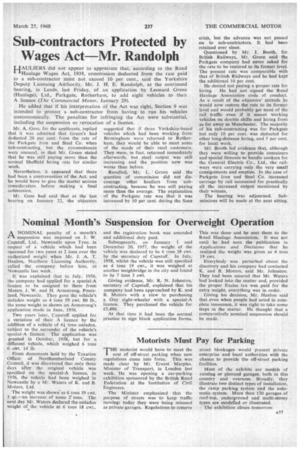Sub-contractors Protected by Wages Act—Mr. Randolph
Page 71

If you've noticed an error in this article please click here to report it so we can fix it.
HAULIERS did not appear to appreciate that, according to the Road
Haulage Wages Act, 1938, commission deducted from the rate paid to a sub-contractor must not exceed 10per cent., said the Yorkshire
Deputy Licensing Authority, Mr. J. H. E. Randolph, at the continued hearing, in Leeds, last Friday, of an application by Leonard Green (Haulage), Ltd., Parkgate, Rotherham, to add eight vehicles to their A licence (The Commercial Motor, January 29).
He added that if his interpretation of the Act was right, Section 9 was intended to protect a sub-contractor from having to run his vehicles uneconomically. The penalties for infringing the Act were substantial, including the suspension or revocation of a licence.
Mr. A. Goss, for the applicants, replied that it was admitted that Green's had deducted 20 per cent from the rate of the Parkgate Iron and Steel Co. when sub-contracting, but the circumstances were unusual, in that Mr. Green stated that he was still paying more than the normal Sheffield hiring rate for similar work.
Nevertheless, it appeared that there had been a contravention of the Act, and he would have to give the matter serious consideration before making a final submission,
Mr. Goss had said that at the last hearing on January 22, the objectors suggested that if three Yorkshire-based vehicles which had been working from Birmingham were returned to Rotherham, they would be able to meet some of the needs of their steel customers. They were, in fact, returned immediately afterwards, but steel output was still increasing and the position now was worse than before.
Recalled, Mr. L. Green said the question of commission did not discourage other hauliers from subcontracting, because be was still paying more than the average. The explanation of the Parkgate rate was that it was increased by 10 per cent. during the Suez crisis, but the advance was not passed on to sub-contractors. It had been retained ever since.
Questioned by Mr. J. Booth, for British Railways, Mr. Green said • the Parkgate company had never asked for the rate to be restored to its former level. The present rate was comparable with that of British Railways and he had kept the additional 10 per cent.
He denied not paying a proper rate for hiring. He had not signed the Road Haulage Association code of conduct. As a result of the objectors' attitude he would now restore the rate to its former level and would probably get most of the rail traffic even if it meant working vehicles on double shifts and hiring from as far away as Manchester. The majority of his sub-contracting was for Parkgate but only 10 per cent, was deducted for other long-distance hiring, and 5 per cent. for local work.
Mr. Booth led evidence that, although they were willing to provide containers and special fitments to handle cookers for the General Electric Co., Ltd., the railways were carrying only the very small consignments and empties. In the case of Parkgate Iron and Steel Co. increased carriage by rail accounted for practically all the increased output mentioned by their witness.
The hearing was adjourned. Submissions will be made at the next sitting.




















































































































